What Are the Risks of Improper Bedding for Chinchillas?

Chinchillas are small, delicate animals that require specific care to thrive. One crucial aspect of their care is providing the proper bedding material in their habitat. Using improper bedding for chinchillas can lead to various risks and consequences that can negatively impact your pet’s well-being.
Improper bedding can cause respiratory issues for chinchillas due to dust or allergens present in certain materials. Additionally, the wrong bedding can lead to skin irritation and even injuries, as some bedding options may have sharp edges or be too rough for chinchilla skin. It is essential to choose bedding that is soft, absorbent, and safe for chinchillas to prevent such risks.
Ensuring that your chinchilla’s habitat is equipped with suitable bedding is crucial for their health and comfort. By understanding the dangers and consequences of using improper bedding, you can provide a safe and nurturing environment for your pet chinchilla.
Health Risks
Improper bedding for chinchillas can pose serious health risks if not addressed promptly and effectively. When it comes to the skin health of chinchillas, the type of bedding used plays a crucial role. Certain bedding options can cause irritation, leading to skin problems if the chinchilla comes into direct contact with them. To ensure optimal skin health, it’s essential to choose bedding materials carefully.
Among the various bedding options available, aspen shavings and paper-based products like pelleted paper bedding are considered safer choices for chinchillas. These materials are less likely to cause skin irritations compared to cedar or pine shavings, which can release aromatic oils harmful to chinchillas. By selecting appropriate bedding options, chinchilla owners can help prevent skin issues and promote overall well-being.
Maintaining good skin health through proper bedding choices is a fundamental aspect of caring for chinchillas. By being mindful of the bedding materials used, owners can create a comfortable and safe environment for their furry companions, reducing the risk of skin-related health problems.
Allergic Reactions
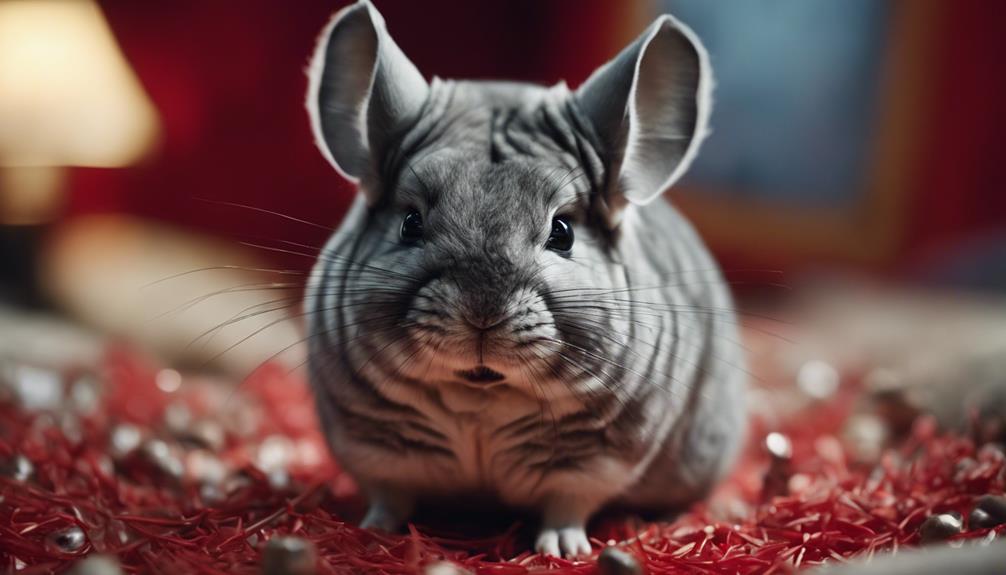
Allergic reactions can occur in chinchillas due to certain types of bedding materials used in their habitats. It’s crucial for chinchilla owners to be aware of the potential risks associated with bedding choices to prevent allergic reactions and ensure the well-being of their pets.
Risks of Improper Bedding for Chinchillas:
- Bedding Material: Some types of bedding materials, such as cedar or pine shavings, can release aromatic hydrocarbons and phenols that may trigger allergic reactions in chinchillas.
- Improper Cleaning: Failure to clean the bedding regularly can lead to the accumulation of dust, mold, and bacteria, increasing the risk of allergic reactions in chinchillas.
- Allergy Prevention: To prevent allergic reactions, consider using safe bedding options like aspen shavings, paper-based bedding, or fleece liners that are less likely to cause respiratory issues or skin irritations in chinchillas.
Respiratory Problems
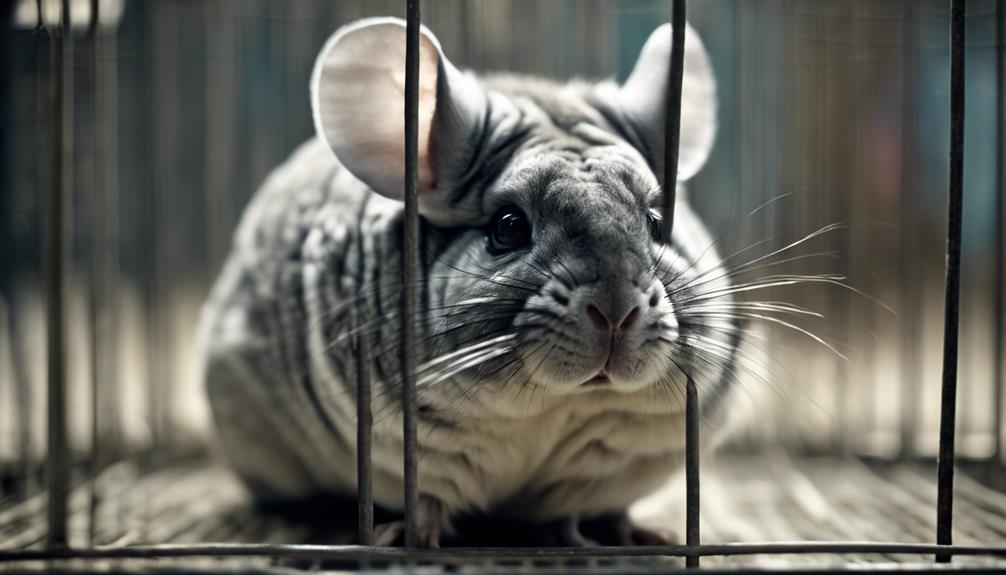
Improper bedding for chinchillas can lead to respiratory problems. Dusty bedding poses a danger as the particles can irritate the chinchilla’s respiratory system.
Mold and mildew in the bedding can also contribute to respiratory issues.
Dusty Bedding Dangers
Excessive dust in chinchilla bedding can lead to serious respiratory issues for these small animals. Dust control and prevention are crucial to maintaining a healthy environment for chinchillas.
Here are three essential points to consider:
- Use Dust-Free Bedding: Opt for bedding materials specifically designed to be low-dust to minimize respiratory irritation.
- Regular Cleaning: Clean the chinchilla’s cage frequently to remove any accumulated dust and debris.
- Proper Ventilation: Ensure the chinchilla’s living space is well-ventilated to reduce the concentration of airborne particles.
Mold and Mildew
Mold and mildew in chinchilla bedding can pose significant risks to their respiratory health. These fungi thrive in damp environments, common when bedding isn’t adequately ventilated or changed regularly. When chinchillas are exposed to mold and mildew spores, they can develop respiratory problems such as sneezing, coughing, and difficulty breathing.
Preventing moisture buildup in bedding is crucial to avoid mold growth. Using bedding materials that absorb moisture effectively, like aspen shavings or paper-based bedding, can help mitigate this risk. Additionally, implementing proper ventilation solutions in the chinchilla’s habitat, such as ensuring good airflow and avoiding overcrowding, can reduce the likelihood of mold and mildew formation.
Taking proactive measures to maintain dry and well-ventilated bedding is essential for safeguarding chinchillas against respiratory issues.
Allergic Reactions
Chinchillas may experience allergic reactions leading to respiratory problems when exposed to certain bedding materials or environmental factors. These reactions can be concerning for chinchilla owners as they can lead to discomfort and potential health issues.
Here are some key points to consider regarding allergic reactions in chinchillas:
- Irritation Risks: Some bedding materials may contain irritants that can trigger allergic reactions in chinchillas, causing respiratory distress.
- Bedding Sensitivity: Chinchillas can be sensitive to certain bedding types, such as cedar or pine shavings, which may exacerbate respiratory problems.
- Environmental Factors: Dust, mold, or strong odors in the chinchilla’s environment can also contribute to allergic reactions and respiratory issues.
Being mindful of these factors can help chinchilla owners provide a safe and comfortable living environment for their pets.
Skin Irritations
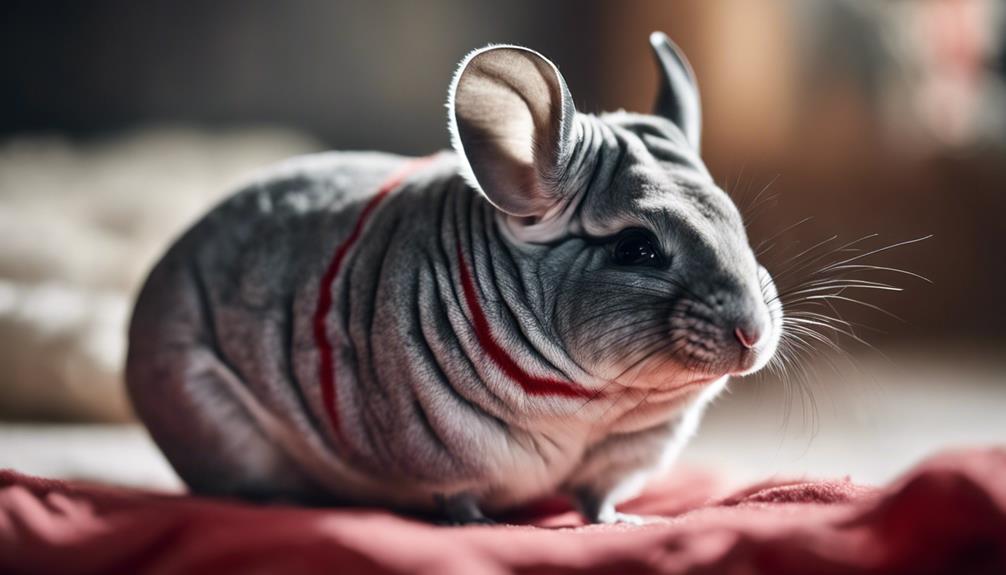
Skin irritations in chinchillas can result from inadequate bedding choices. The bedding texture and material sensitivity play crucial roles in preventing skin issues. Chinchillas have delicate skin, and using inappropriate bedding can lead to irritation, dryness, or even more severe conditions.
| Bedding Type | Description |
|---|---|
| Kiln-Dried Pine | Soft and absorbent, suitable for chinchillas. |
| Paper-Based | Gentle on skin, low dust, great for sensitive chinchillas. |
| Aspen Shavings | Good for burrowing, but may cause skin irritation in some chinchillas. |
| Fleece Liners | Soft and comfortable, but require frequent cleaning. |
Chinchillas are prone to developing dermatitis if exposed to bedding materials that are harsh or dusty. It is essential to choose bedding options that promote skin health and minimize the risk of irritations. Regularly inspecting the chinchilla’s skin and ensuring the bedding is clean and suitable for their sensitive skin can help prevent skin issues. If any signs of skin irritation appear, consulting a veterinarian for appropriate treatment is recommended.
Ingestion Dangers
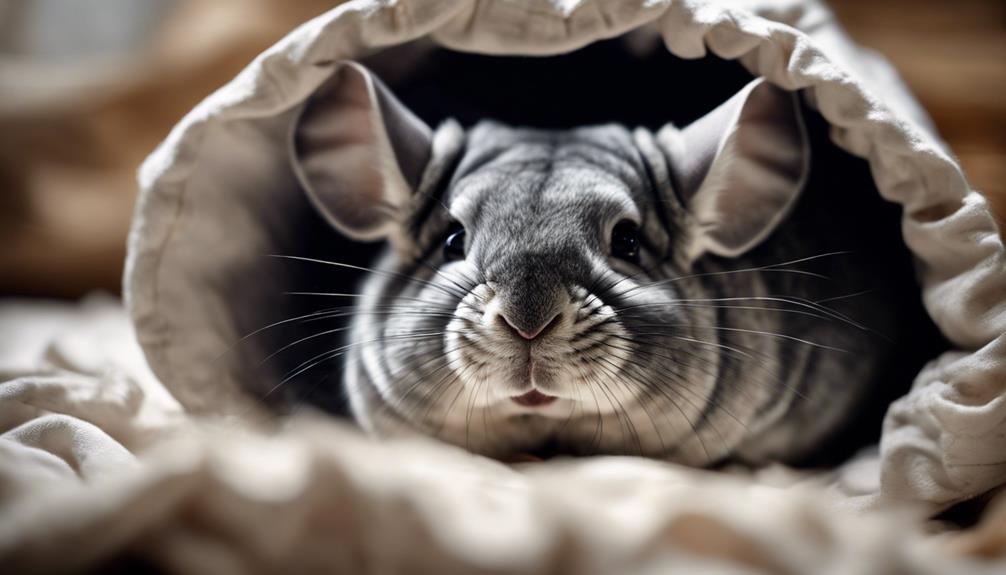
When selecting bedding for chinchillas, one must be mindful of potential ingestion dangers that could harm their health. Chinchillas are prone to exploring their environment with their mouths, making it crucial to choose bedding that won’t pose any risks if ingested.
Here are some key points to consider regarding ingestion dangers:
- Choking Hazards: Chinchillas may accidentally ingest bedding materials like wood shavings or hay that can lead to choking hazards. It’s essential to opt for safe bedding options that are dust-free and less likely to break into small, ingestible pieces.
- Digestive Problems: Certain bedding materials can cause digestive issues if consumed by chinchillas. For instance, cedar and pine shavings emit aromatic oils that can be harmful when ingested, leading to gastrointestinal problems. Opting for chinchilla-safe bedding like paper-based options can help prevent such digestive complications.
- Toxicity Concerns: Some bedding types may contain chemicals or toxins that are harmful if ingested by chinchillas. It’s crucial to avoid bedding that has been treated with pesticides or other harmful substances to prevent toxicity-related health issues in these small pets.
Behavioral Issues
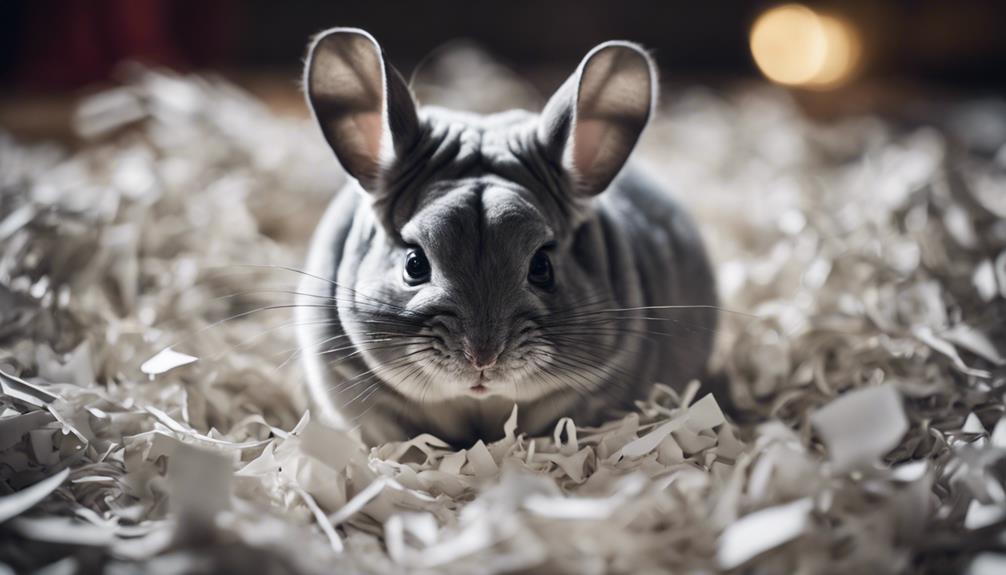
One common behavioral issue observed in chinchillas is excessive chewing on inappropriate items. This behavior can be a result of boredom, lack of proper enrichment activities, or inadequate socialization needs. Chinchillas are naturally curious and active animals, so providing them with a stimulating environment is crucial to prevent destructive behaviors.
| Enrichment Activities | Socialization Needs |
|---|---|
| 1. Chew toys | 1. Daily interaction |
| 2. Exercise wheel | 2. Playtime outside cage |
| 3. Wooden blocks | 3. Interaction with other chinchillas |
| 4. Foraging toys | 4. Safe exploration areas |
When it comes to addressing behavioral issues in chinchillas, the cage setup plays a significant role. Ensuring the cage is spacious, well-equipped with appropriate toys, and has different levels for climbing and exploration can help keep the chinchilla engaged. Additionally, utilizing gentle handling techniques and providing positive reinforcement during interaction can build trust and reduce stress in chinchillas. By focusing on enrichment activities, socialization needs, cage setup, and handling techniques, chinchilla owners can promote a happy and well-adjusted pet.
Environmental Hazards
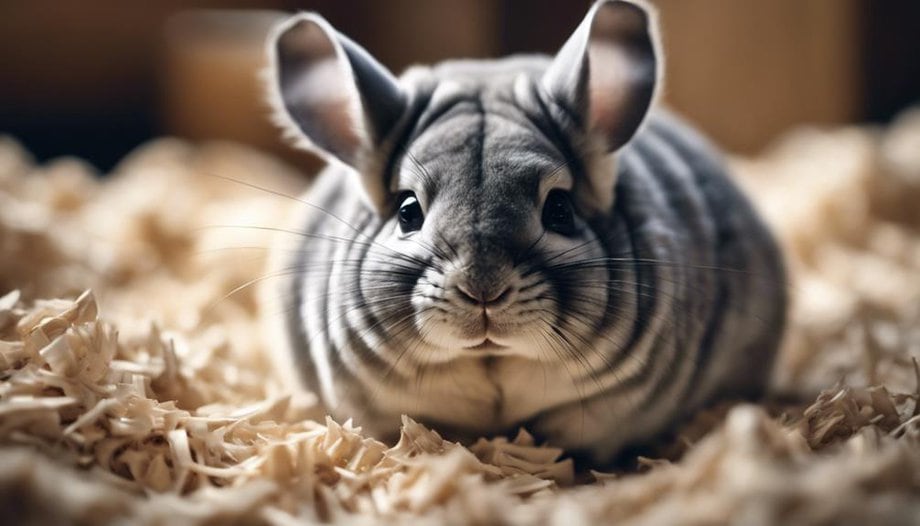
Improper bedding for chinchillas can pose environmental hazards that affect their well-being. The type of bedding used is crucial as it can impact the chinchilla’s respiratory health and overall comfort.
Dust levels, allergies, and temperature regulation are key factors to consider to ensure a safe and healthy environment for these small pets.
Bedding Type Importance
Choosing the appropriate bedding for chinchillas is crucial to prevent environmental hazards. When considering bedding type for chinchillas, several key factors come into play:
- Bedding selection: Opt for bedding that provides comfort and support for your chinchilla’s sensitive feet.
- Bedding material: Select bedding material that promotes hygiene and is non-toxic to chinchillas.
- Bedding depth: Ensure the bedding layer is deep enough to allow for burrowing and natural behaviors.
Dust and Allergies
Proper selection of bedding for chinchillas is essential to minimize the risks associated with dust and allergies in their environment. Dust control plays a crucial role in maintaining the health of chinchillas, as excessive dust levels can lead to respiratory issues and skin irritations. Choosing dust-free bedding options such as paper-based or aspen shavings can help prevent these problems. Additionally, regular cleaning of the cage and changing bedding frequently can further reduce dust accumulation.
Allergy prevention is also vital when selecting bedding materials to ensure the well-being of chinchillas and their owners. By opting for hypoallergenic bedding choices and keeping the environment clean, the likelihood of allergic reactions can be significantly reduced, creating a safer and healthier space for these adorable pets.
Temperature Regulation
Effective temperature regulation is crucial for maintaining the health and well-being of chinchillas in their environment. When it comes to bedding for chinchillas, considering insulation effectiveness and bedding preferences is essential for proper temperature control.
Here are some key points to keep in mind:
- Insulation Effectiveness: Choosing bedding materials that provide adequate insulation is vital to help chinchillas regulate their body temperature effectively.
- Bedding Preferences: Understanding the bedding preferences of chinchillas can help create a comfortable environment that supports their natural behaviors.
- Temperature Control: Monitoring the temperature in the chinchilla’s habitat and adjusting bedding materials accordingly can help prevent overheating or chilling.
Frequently Asked Questions
Can Chinchillas Develop Behavioral Issues Related to Improper Bedding Choices?
Improper bedding for chinchillas can lead to behavioral concerns. Owners must choose wisely to avoid potential issues. Training methods and mental health are impacted. Enrichment activities become crucial in ensuring chinchillas’ well-being and happiness.
How Can Environmental Hazards in Bedding Affect a Chinchilla’s Health?
The texture of bedding can impact chinchilla behavior, while improper material may affect digestion. Maintaining suitable bedding can promote a chinchilla’s health and well-being. It’s crucial to choose bedding that supports both their comfort and physical health.
Are There Any Long-Term Consequences of Using Bedding That May Cause Respiratory Problems?
Using improper bedding for chinchillas can lead to respiratory risks, potentially causing long-term consequences. It’s essential to provide suitable bedding to prevent health issues and ensure the well-being of these small pets.
What Are Some Common Signs of Skin Irritations in Chinchillas Caused by Bedding?
Common signs of skin irritations in chinchillas due to improper bedding include redness, itching, and hair loss. Chinchillas may exhibit excessive scratching or develop sores. Regularly inspecting their skin and providing suitable bedding can prevent these issues.
Can Ingestion Dangers From Improper Bedding Lead to Serious Health Complications in Chinchillas?
Ingestion risks from improper bedding can lead to serious health complications in chinchillas. It’s crucial to provide safe bedding options to prevent digestive issues and potential harm. Proper bedding choices are essential for maintaining chinchilla health.











